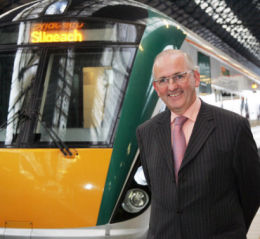Posted 12th November 2007
Feature: The Irish State has the vision - we deliver it

Dick Fearn, Chief Executive, Iarnród Éireann
Dick Fearn leant back in the chair in his office, which sits alongside Dublin Connolly station’s busy suburban platforms. With a broad smile, he said: “I am very comfortable with the way things are here.”
He was responding to my suggestion that he is in a unique position to express a view on railway organisations. Having joined British Rail as a management trainee and risen to become one of Chris Green’s first Network SouthEast divisional directors (of Thames & Chiltern), Dick went on to lead a management buy-out bid for the Southeastern franchise. He failed, but Connex kept him on as managing director.
Next he ‘crossed the floor’ to become director of Railtrack’s North West zone – which is why his Dublin office boasts a framed picture of what was once dubbed ‘the Railtrack Stand’ at the Gresty Road ground of his beloved Crewe Alexandra football club.
Later, he became director of Railtrack’s Midlands zone, based in Birmingham, where one of his most demanding customers was former boss Chris Green, by then chief executive of Virgin Trains.
Then, in 2003, Dick was head-hunted for the post of chief operating officer of Iarnród Éireann. Only two years later the head of IE, Joe Meagher, left to run Dublin Bus, another subsidiary of CIE, the nationalised holding company that controls main-line rail and bus operations in Ireland – and Dick moved up to become IE’s acting managing director.
At that time, Ireland’s politicians were preparing their Transport 21 ten-year plan and debating whether to follow UK examples and privatise bus and main-line rail operations. The new Dublin tram system, LUAS, was franchised to Veolia Transport Ireland, a Connex subsidiary, by the newly-created Rail Procurement Agency. But bus and main-line rail privatisation retreated on to the political back burner and Dick Fearn was offered a seven-year contract as chief executive of Iarnród Éireann.
“After BR privatisation, when I was at Connex, and again at Railtrack, a good 90 per cent of my time was taken up with contractual issues. But here in Ireland,” said Dick, looking through his office window to where thousands of rail passengers poured on to platforms in the morning peak, “I can focus most of my time on delivering a high quality rail service to all out customers.
“That’s good, because I am not a lawyer. My strength is as a rail operator.”
The Irish government’s view, he explained, is that the State should have a vision of what is wanted from the public utilities and how they should be funded. “But the politicians then respect the professionals to deliver the vision. Government sets the agenda, then leaves the professional people to get on with delivering it.”
He explained that if any citizen, or even a TD (Irish MP), writes a complaint to the Transport Minister, they get a polite reply which will also state that a copy has been forwarded to Dick Fearn for his personal attention. It then becomes a matter to be followed through by Dick and his people.
His team at IE comprises some 5,000 staff members – now known as ‘colleagues’ – and Dick Fearn is immensely proud of its multi-ethnicity. “We have 30 nationalities working for us, including me, an Englishman.”
His top team alone includes a Scotsman, an Ulsterman, and a South African. And his chief engineer, infrastructure, Eileen Wilcock, though from County Mayo, gained her civil engineering degree in London, went on to work for Deutsche Bahn (German Railways), then travelled the world with DB’s consulting division before returning to Ireland.
Dick himself now lives in the smart southern Dublin suburb of Killiney and commutes to work on the DART trains. But his mother still lives in Crewe, so he travels to England regularly via Holyhead. “No cheap flights for me,” he laughed, “and the train service to Crewe is very good now.”
To meet the Irish government’s 10-year plan, IE is following a two-pronged strategy of increasing both capacity and quality of service. It’s a philosophy that Dick Fearn is applying to the three main train
service brands of Commuter, DART and InterCity – “a wonderful brand, and totally overlooked in Britain,” Dick said.
All routes are showing strong growth with the exception of the Dublin-Belfast Enterprise service, which is run in partnership with Northern Ireland Railways, now the responsibility of the devolved Northern Ireland Assembly.
The cross-border trains operate at approximately two-hourly intervals and have journey times of around 2 hrs 10 mins.
Dick Fearn sees a very real need to step up the quality of service on the Northern route, with economic activity between Dublin and Belfast increasing steadily as a result of the peace process. So the objective, he says, is to increase frequency to hourly, with a journey time close to two hours.
Three more trains will be required to run an hourly service. “We are working up the business case for new resources with NIR,” he explained.
These could be based on the InterCity railcars now being delivered to IE or push-pull locomotive operations, possibly using the Mk3 coaches displaced by the new railcars. “Or we could just go to the market to see what is on offer,” he said.
To achieve a two-hour Enterprise journey time between the two capitals will require current line speeds to be lifted to at least 100mph.
This is not seen as a major problem south of the border, but a lot of work will be needed in the north to lift present speed restrictions.
Certainly, it has proved a good time for Dick Fearn to move from Britain’s fragmented railway industry to Ireland’s vertically-integrated organisation.
“It is the best job that anyone has ever given me,” he agreed.
“I feel extremely privileged and I shall continue to give 150 per cent.”
